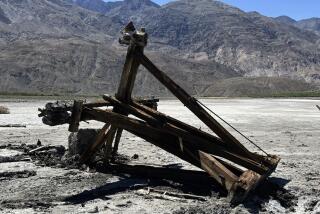Limits on Pumping to Protect Smelt : Water: U.S. officials order 20% monthly reduction when more than 400 fish are killed in a day.
Federal officials attempting to protect the threatened delta smelt have determined that pumping in the Sacramento-San Joaquin River Delta must be cut by at least 20% this summer if too many of the finger-size fish are killed or trapped by the pumps.
The temporary requirement--which has been triggered once this month--is unlikely to curtail water deliveries to Southern California because reservoirs are brimming from the winter’s plentiful rain and snowfall.
It could cut deeply into reservoir storage that had been expected to last into next year, removing some of the insurance water that officials wanted against a renewed drought in 1994. Since the new requirement was imposed two weeks ago, state officials have been drawing water from San Luis Reservoir, one of the state’s largest, at a rate that could bring it close to zero before the next rainy season, according to water officials.
“We are concerned about next year,” said John Silveira, deputy director of the state Department of Water Resources, which operates the State Water Project. “I would like to see us have some firm evidence of the (delta smelt) problem and how the problem manifests itself before we are asked to sacrifice water for our constituents in the south.”
Most of the state’s drinking and irrigation water supplies are drawn from the delta, where mountain runoff collects on its way toward San Francisco Bay. Two major pumping plants--one run by the state, the other by the U.S. Bureau of Reclamation--trap and often kill large numbers of disoriented fish, including thousands of delta smelt.
In March, the fish was declared threatened under the federal Endangered Species Act, and state officials are considering a similar designation. The new pumping requirements were contained in a biological opinion by the U.S. Fish and Wildlife Service required by the Endangered Species Act.
The opinion, released last week, imposes restrictions ranging from 20% to 33% of pumping capacity when more than 400 delta smelt per day become ensnared in the two plants during the spring and summer spawning months. If the 400-fish level is passed more than once in a month, additional pumping restrictions could follow, the opinion said.
Last week, the pumping plants violated the 400-fish rule, leading to a mandatory 20% pumping curtailment for the remainder of June, according to Fish and Wildlife Service officials.
“We have got to benefit the wildlife, but people as well. I think this is a pretty good compromise,” said Matt Vandenberg, a fisheries biologist with the federal agency. “It is really beneficial to everyone if they curtail their pumping as significantly as possible to avoid additional problems.”
The 400-fish level is based on a daily average of delta smelt killed or trapped in the pumps during the month of May, another important spawning month, Vandenberg said. But some environmentalists say that the threshold is too high because an unusually large number of fish were ensnared in May.
“It is pretty disappointing,” said David Behar, executive director of the Bay Institute of San Francisco, who said May was one of the worst months for delta smelt in six years. “This is an example of the Fish and Wildlife Service wimping out to the water diverters.”
Behar said environmental groups are working for more stringent requirements in February, when the biological opinion expires and the Fish and Wildlife Service is expected to impose permanent protections for the delta smelt. “This doesn’t set any precedent as far as protections needed in the future,” Behar said.
State and federal water officials fear that the 400 level is too stringent and, if made permanent, would hinder their ability to provide water statewide. They also plan to recommend changes in next year’s opinion.
Jeff McCracken, a spokesman for the Bureau of Reclamation, said supplies to Central Valley farmers will not be affected by this year’s biological opinion because they had been cut in half in anticipation of the opinion and other water delivery problems. “But next year is a whole different ballgame,” he said.
Vandenberg said it is too early to predict what will be required next year because there is insufficient data on the delta smelt. He said biologists hope an evaluation of this year’s operations will provide the needed information.
More to Read
Start your day right
Sign up for Essential California for news, features and recommendations from the L.A. Times and beyond in your inbox six days a week.
You may occasionally receive promotional content from the Los Angeles Times.






